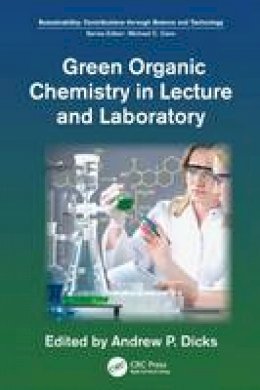"Green Organic Chemistry in Lecture and Laboratory is a valuable compilation of classroom and laboratory examples suitable for undergraduate organic chemistry. … Educating students about environmentally friendly alternatives to traditional solvents, reagents, and reaction conditions fosters critical thinking and promotes sustainability through green chemistry. Green Organic Chemistry in Lecture and Laboratory is a useful reference book that will assist faculty in fostering these skills in their students." —Mary M. Kirchhoff, American Chemical Society, in Journal of Chemical Education, 2013 "This book is clearly directed at anyone who is interested in designing and implementing a green organic chemistry course, either by ‘greening’ existing courses or by launching a new course. It will provide the reader with an extensive source of information on the recent advances that have been made in green chemistry educational material for use in undergraduate curricula. The clear and concise layout of the book allows readers to target specific areas they are interested in, but the chapters are also properly cross-referenced for more in-depth reading. Case studies from academic and industry perspectives throughout the book provide real life examples and demonstrate the big picture application of course content." —Louise Summerton of York University, U.K., in Chemistry Industry, 2012, 76(2), 46-47 "This book helps to bring the world of green chemistry to not only the scientists and engineers of the future, but also to our prospective political leaders, economists, business leaders, teachers and world citizens." — Michael Cann, Chemistry Department, University of Scranton "[This book] covers a wide range of key themes, ranging from the 12 principles of green chemistry via various different approaches to conventional synthetic procedures, waste management and waste valorisation. What is vital to emphasise to students and to researchers is that any given technique is not necessarily green; rather it is how it is used that will decide this. ... This book makes this point several times, which is refreshing. This indicates care and depth , and should be repeated to ensure students are able to critically evaluate the reality of a case, rather than simply tick a box. The book is detailed and very readable – it is certainly a valuable addition to the area." —Duncan Macquarrie, Chemistry World, July 2012 "The principles of green chemistry should be taught to all undergraduates, but most of the available books on green chemistry do not, to my mind, provide the industrial focus, particularly the process chemistry focus, that is necessary. All that has changed with this new book, which, in most chapters, puts an industrial emphasis on the principles of green chemistry. … Overall I enjoyed reading this practical book … . The book is highly recommended to all interested in green chemistry." —Dr. Trevor Laird, Editor, Organic Process Research & Development, March 2013 "Green Organic Chemistry in Lecture and Laboratory is a valuable compilation of classroom and laboratory examples suitable for undergraduate organic chemistry. … Educating students about environmentally friendly alternatives to traditional solvents, reagents, and reaction conditions fosters critical thinking and promotes sustainability through green chemistry. Green Organic Chemistry in Lecture and Laboratory is a useful reference book that will assist faculty in fostering these skills in their students." —Mary M. Kirchhoff, American Chemical Society, in Journal of Chemical Education, 2013 "This book is clearly directed at anyone who is interested in designing and implementing a green organic chemistry course, either by ‘greening’ existing courses or by launching a new course. It will provide the reader with an extensive source of information on the recent advances that have been made in green chemistry educational material for use in undergraduate curricula. The clear and concise layout of the book allows readers to target specific areas they are interested in, but the chapters are also properly cross-referenced for more in-depth reading. Case studies from academic and industry perspectives throughout the book provide real life examples and demonstrate the big picture application of course content."—Louise Summerton of York University, U.K., in Chemistry Industry, 2012, 76(2), 46-47 "This book helps to bring the world of green chemistry to not only the scientists and engineers of the future, but also to our prospective political leaders, economists, business leaders, teachers and world citizens."—Michael Cann, Chemistry Department, University of Scranton "[This book] covers a wide range of key themes, ranging from the 12 principles of green chemistry via various different approaches to conventional synthetic procedures, waste management and waste valorisation. What is vital to emphasise to students and to researchers is that any given technique is not necessarily green; rather it is how it is used that will decide this. ... This book makes this point several times, which is refreshing. This indicates care and depth , and should be repeated to ensure students are able to critically evaluate the reality of a case, rather than simply tick a box. The book is detailed and very readable – it is certainly a valuable addition to the area."—Duncan Macquarrie, Chemistry World, July 2012 "The principles of green chemistry should be taught to all undergraduates, but most of the available books on green chemistry do not, to my mind, provide the industrial focus, particularly the process chemistry focus, that is necessary. All that has changed with this new book, which, in most chapters, puts an industrial emphasis on the principles of green chemistry. … Overall I enjoyed reading this practical book … . The book is highly recommended to all interested in green chemistry."—Dr. Trevor Laird, Editor, Organic Process Research & Development, March 2013

